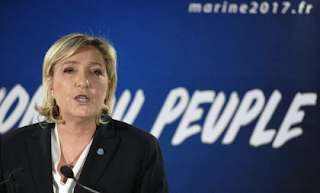The stakes in French election just went up a notch further after far-right leader Marine Le Pen pledged last 6 December that she would campaign for France to leave the EU unless Brussels agreed to return full powers to control immigration and economic policy to member states.
The presidential candidate has promised if elected in May to dump the euro and organize a Brexit-style referendum on France's membership in the European Union.
But recently she has appeared to soften her stance, saying a "common currency" could coexist with the national unit.
Addressing a gathering of foreign correspondents, the National Front (FN) leader insisted she had "not changed my mind."
If she won the vote on 7 May, she would immediately begin negotiations with the EU on restoring "four fundamental types of sovereignty: territorial, economic, monetary and legislative".
The discussions, she said, would focus on her demands for the return of intra-EU borders, an end to the primacy of EU over national law, and the right for France to toss out the euro and adopt a policy of "economic patriotism".
Six months later she would put the outcome to a "Frexit" in/out referendum.
"Either I will have secured the return of those four sovereignties and I will advise the French to remain in a new Europe of nations, or I will not and then I will advise them to leave the EU," she vowed.
The anti-immigration Le Pen is one of the top contenders for the presidency, buoyed by anger with elites and concern over migration accentuated by a series of jihadist attacks - factors that fuelled Britain's decision to quit the EU and Donald Trump's rise in the United States.
Le Pen said the British and US results heralded the "grand return of the nation state".
Most polls show her qualifying for - but losing - the run-off second round of the election in May against the conservative candidate Francois Fillon.
The presidential candidate has promised if elected in May to dump the euro and organize a Brexit-style referendum on France's membership in the European Union.
But recently she has appeared to soften her stance, saying a "common currency" could coexist with the national unit.
Addressing a gathering of foreign correspondents, the National Front (FN) leader insisted she had "not changed my mind."
If she won the vote on 7 May, she would immediately begin negotiations with the EU on restoring "four fundamental types of sovereignty: territorial, economic, monetary and legislative".
The discussions, she said, would focus on her demands for the return of intra-EU borders, an end to the primacy of EU over national law, and the right for France to toss out the euro and adopt a policy of "economic patriotism".
Six months later she would put the outcome to a "Frexit" in/out referendum.
"Either I will have secured the return of those four sovereignties and I will advise the French to remain in a new Europe of nations, or I will not and then I will advise them to leave the EU," she vowed.
The anti-immigration Le Pen is one of the top contenders for the presidency, buoyed by anger with elites and concern over migration accentuated by a series of jihadist attacks - factors that fuelled Britain's decision to quit the EU and Donald Trump's rise in the United States.
Le Pen said the British and US results heralded the "grand return of the nation state".
Most polls show her qualifying for - but losing - the run-off second round of the election in May against the conservative candidate Francois Fillon.

